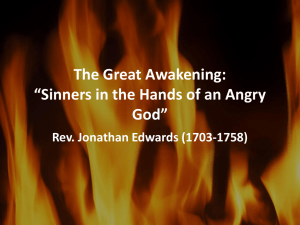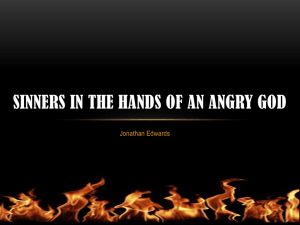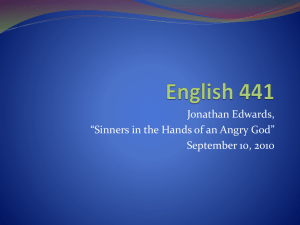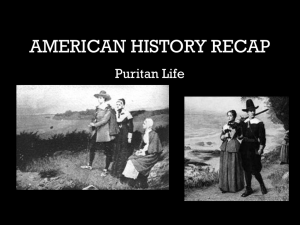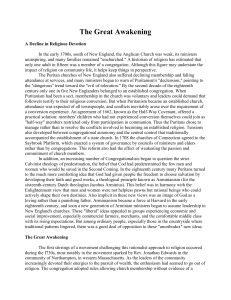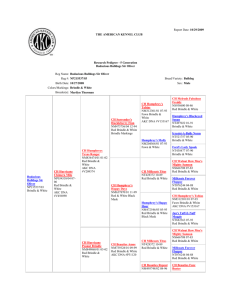Mr. Brindle ENG 11 – American Lit. Name Date ______ Period
advertisement
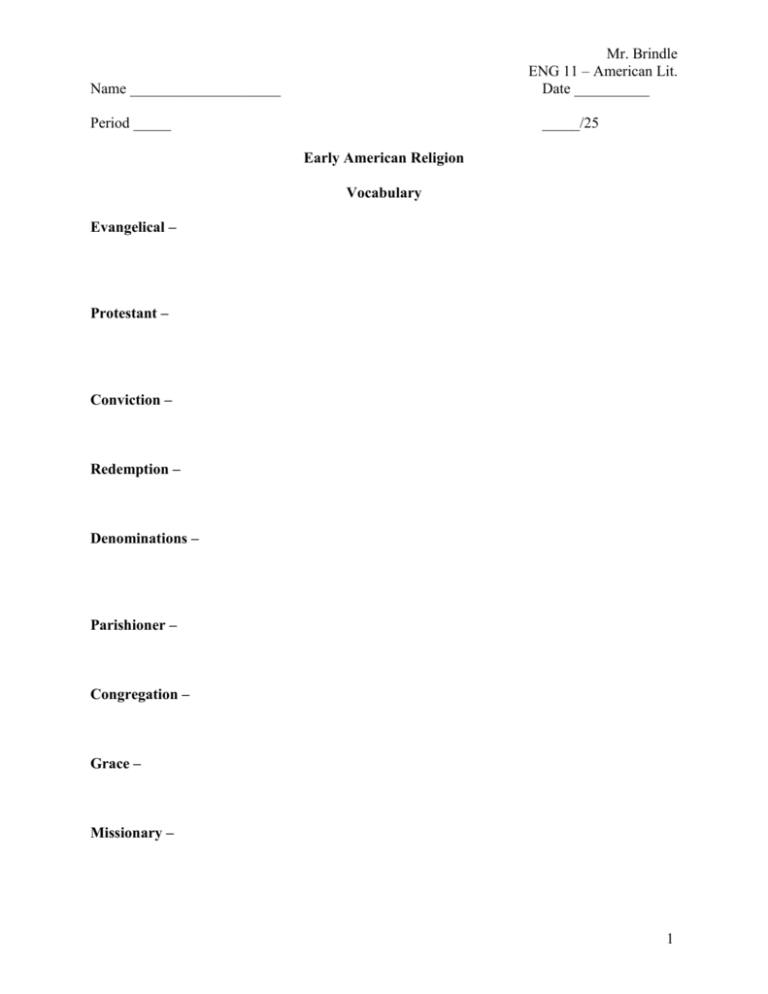
Mr. Brindle ENG 11 – American Lit. Date __________ Name ____________________ Period _____ _____/25 Early American Religion Vocabulary Evangelical – being in agreement with the Christian gospel especially as it is presented in the four Gospels Protestant – a member of any of several church denominations denying the universal authority of the Pope and affirming the Reformation principles of justification by faith alone Conviction – the act of convincing a person of error or of compelling the admission of a truth Redemption – making a bad or unpleasant thing or person better or more acceptable Denominations – a religious organization whose congregations are united in their adherence to its beliefs and practices Parishioner – the member of a church community Congregation – an assembly of persons met for worship and religious instruction Grace – a virtue coming from God Missionary – a person undertaking a religious mission 1 Mr. Brindle ENG 11 – American Lit. Theological – the study of religious faith, practice, and experience; especially the study of God and of God's relation to the world Scripture – a body of writings considered sacred or authoritative Divine – proceeding directly from God or a god Condemnation – a reason for declaring wrong or evil Wrath – strong vengeful anger Covenant – Doctrine – something that is taught. A principle, position, or the body of principles in a branch of knowledge or system of belief a formal and serious agreement or promise ______________________________________________________________________________ ______________________________________________________________________________ ______________________________________________________________________________ ______________________________________________________________________________ ______________________________________________________________________________ ______________________________________________________________________________ ______________________________________________________________________________ ______________________________________________________________________________ ______________________________________________________________________________ ______________________________________________________________________________ ______________________________________________________________________________ ______________________________________________________________________________ ______________________________________________________________________________ ______________________________________________________________________________ ______________________________________________________________________________ ______________________________________________________________________________ ______________________________________________________________________________ ______________________________________________________________________________ ______________________________________________________________________________ 2 Mr. Brindle ENG 11 – American Lit. An Overview of the “Awakenings” The Great Awakening: Used to refer to several periods of religious revival in American religious history. Characterized by: - Widespread revivals led by evangelical Protestant ministers. - A sharp increase of interest in religion. - A profound sense of conviction and redemption on the part of those affected. - An increase in evangelical church membership. - The formation of new religious movements and denominations. The First Great Awakening (1730-1743) - Leaders had little interest in merely engaging parishioners' intellects; rather, they sought a strong emotional response from their congregations that might yield the workings and experiential evidence of saving grace. The Second Great Awakening (1800-1840) - A religious revival that occurred in the United States beginning in the late eighteenth century and lasting until the middle of the nineteenth century. - While it occurred in all parts of the United States, it was especially strong in the Northeast and the Midwest. - It is also noteworthy to point out that this awakening was unique in that it moved beyond the educated elite of New England to those that were less wealthy and less educated. The Third Great Awakening (1850-1900) - Characterized by new denominations, very active missionary work, and also the Social Gospel approach to social issues. - It resulted in the addition of approximately one million converts to the churches of the United States. - It tied the gospel with social work in a manner that had not been seen in this country before. - It prepared the nation for the blood bath it would soon experience in the war years of 18611865 (the Civil War). The Fourth Great Awakening (????-????) - A debated concept that has not received the acceptance of the first three. - Some say it happened in the late 1960s and early 1970s when the "mainline" Protestant denominations weakened sharply in both membership and influence while the most conservative religious denominations (such as the Southern Baptists and Missouri Synod Lutherans) grew rapidly in numbers, spread across the United States, had grave internal theological battles and schisms, and became politically powerful. 3 Mr. Brindle ENG 11 – American Lit. Jonathan Edwards “Sinners in the Hands of an Angry God” Delivered: July 8, 1741 to a congregation in Enfield, Massachusetts in the midst of the Great Awakening (1730-1755). Characteristics: Combines vivid imagery of Hell with observations of the world and citations of scripture. Purpose: Edwards's aim was to teach his listeners about the horrors of hell, the dangers of sin and the terrors of being lost. Edwards described the shaky position of those who do not follow Christ's urgent call to receive forgiveness. Edward’s Point: Hoped that the imagery and message of his sermon would awaken his audience to the horrific reality that awaited them should they continue without Christ. Underlying Point: The underlying point is that God has given humanity a chance to rectify their sins. Edwards says that it is the will of God that keeps wicked men from the depths of Hell. This act of restraint has given humanity a chance to mend their ways and return to Christ. Effect and Legacy: Jonathan Edwards was interrupted many times before finishing the sermon by people moaning and crying out, "What shall I do to be saved?" 4 Mr. Brindle ENG 11 – American Lit. Edwards’ Ten Considerations/Doctrines: 1. God may cast wicked men into hell at any given moment. Meaning: 2. The Wicked deserve to be cast into hell. Divine justice does not prevent God from destroying the Wicked at any moment. Meaning: 3. The Wicked, at this moment, suffer under God's condemnation to Hell. Meaning: 4. The Wicked, on earth - at this very moment - suffer the torments of Hell. The Wicked must not think, simply because they are not physically in Hell, that God (in Whose hand the Wicked now reside) is not - at this very moment - as angry with them as he is with those miserable creatures he is now tormenting in hell, and who - at this very moment - do feel and bear the fierceness of his wrath. Meaning: 5. At any moment God shall permit him, Satan stands ready to fall upon the Wicked and seize them as his own. Meaning: 5 Mr. Brindle ENG 11 – American Lit. 6. If it were not for God's restraints, there are, in the souls of wicked men, hellish principles reigning which, presently, would kindle and flame out into hellfire. Meaning: 7. Simply because there are not visible means of death before them at any given moment, the Wicked should not feel secure. Meaning: 8. Simply because it is natural to care for oneself or to think that others may care for them, men should not think themselves safe from God's wrath. Meaning: 9. All that wicked men may do to save themselves from Hell's pains shall afford them nothing if they continue to reject Christ. Meaning: 10. God has never promised to save us from Hell, except for those contained in Christ through the covenant of Grace. Meaning: Final Question (50 points): Although the sermon has received criticism, Edwards' words have endured and are still read to this day. Edwards' sermon continues to be the leading example of a Great Awakening sermon and is still used in religious and academic studies, over 270 years later. In a five-paragraph essay, explain the significance of Edwards’ sermon in today’s society. Your essay may be handwritten or typed. Attach this document to your essay. No late submissions will be accepted. 6


